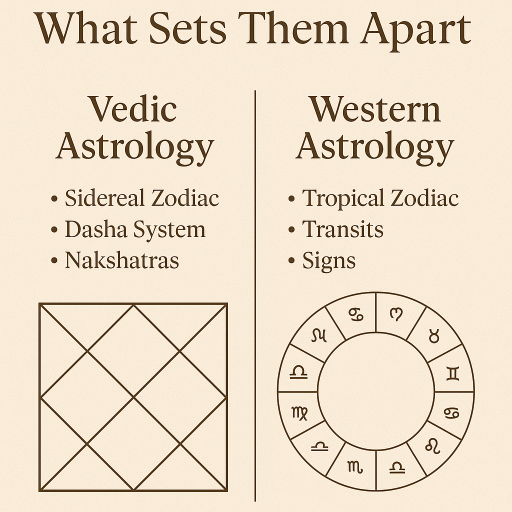Vedic vs. Western Astrology: What Sets Them Worlds Apart?
How Dasha Timing, Degree Precision, and Karmic Clarity Reveal the Difference

Astrology is a universal language — but like all languages, its dialects differ. Two of the most widely practiced systems today are Western astrology and Vedic astrology (also called Jyotish, the “science of light”).
While Western astrology dominates horoscopes in magazines and apps, Vedic astrology offers a far deeper, time-tested, and spiritually grounded approach — especially when it comes to life events, karmic timing, and soul purpose.
In this post, let’s explore the key differences between Western and Vedic astrology, using real examples — from the Dasha system to the zodiac calculation and why Vedic astrology is known for its accuracy and transformative potential.
1. Sidereal vs. Tropical Zodiac — Why Your Sign Might Change
The biggest difference begins with how the zodiac is measured.
Western astrology uses the Tropical Zodiac, which is aligned to the Earth’s seasons (Spring = Aries).
Vedic astrology uses the Sidereal Zodiac, which aligns with the actual star constellations in the sky.
Over centuries, due to the Earth’s axial precession, the two systems have diverged by about 23–24 degrees. This means your Sun sign may be different in Vedic astrology.
Example: A person with a Western Sun in Gemini may actually have a Vedic Sun in Taurus.
This shift in degrees changes not only your Sun sign, but all planetary placements — and thus, the interpretation of your karma, personality, career, and relationships.
2. The Dasha System — Predicting “When” Things Happen
One of the most powerful features of Vedic astrology is the Vimshottari Dasha system — a planetary timeline that shows when specific karmas will manifest.
In Western astrology, predictions are often made through transits. While useful, they can feel general or hard to time precisely.
Vedic astrology, on the other hand, combines transits with Dashas — giving a much sharper prediction window.
Example:
Someone going through a Venus–Moon Dasha may find themselves entering a romantic relationship or marriage — even if no transit shows it strongly.
Someone in Saturn–Rahu might go through intense career restructuring or inner transformation — often exactly timed.
3. Nakshatras — The 27 Lunar Gateways
In addition to zodiac signs, Vedic astrology uses a unique 27-fold division of the sky called Nakshatras. These are lunar constellations that add a deep layer of subtle psychological and karmic meaning.
Each Nakshatra carries:
A ruling deity
Symbolic energy
A karmic lesson
Example:
Two people with Moon in Taurus — one in Rohini, one in Krittika — will have completely different emotional needs and karmic makeup.
This detail is often missing in Western charts, but in Jyotish, it’s essential for reading emotional tendencies, marriage timing, career dharma, and even spiritual orientation.
4. Predictive Accuracy — More Than Personality
Western astrology often leans toward personality and psychology (which is beautiful and useful). But Vedic astrology goes beyond that — it’s about karma and timing.
Vedic astrology is often used to:
Time marriage, children, career shifts, health issues
Diagnose karmic patterns from past lives
Identify remedies (mantras, rituals, fasts, gemstones) to balance planetary energies
Guide spiritual progress
Example:
A Vedic astrologer may look at your chart and say:
“You may face a career reset in 2027 when your Saturn Dasha begins. Prepare by focusing on skill development now.”
That’s not vague. That’s precision.
5. The Spiritual Core of Jyotish
Vedic astrology is rooted in dharma — the soul’s path — and draws from the Vedas, making it as much a spiritual science as it is a predictive tool.
Where Western astrology might say:
“You’re a Leo, so you’re creative.”
Vedic astrology will say:
“You have Jupiter in Purva Phalguni Nakshatra in the 5th house. This indicates past life merit related to the arts, and teaching may be your soul’s path.”
It’s that level of depth and precision that draws seekers to Jyotish.
Two Systems, One Sky
Both Western and Vedic astrology offer insights. But if you’re looking for timing, karmic clarity, spiritual remedies, and deep life guidance, Vedic astrology gives you the tools, timing, and transformation you may be seeking.

Very nice
Difference between vedic astrology and others. Vedic astrology gives deeply and accurate predictions.
Great knowledge
Highly appreciated 👍
Great knowledge
Highly appreciated 👍
Great
Vedic astrology is deeply predictive than western astrology .very nicely explained.
Great 👍😊
Great 👍😊